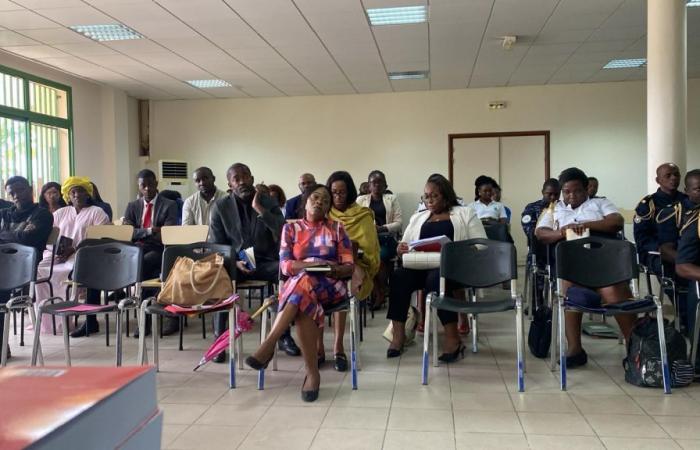
On Friday, December 20, 2024, a presentation ceremony of OHADA works was held at the National School of Magistracy, organized by the OHADA GABON Club and the Association of Young Lawyers of Gabon.
At the start of the latter, the Director General of the National School of Magistracy, speaking first, thanked the organizers for having chosen the said school to host this ceremony before wishing the most cordial welcome to Master Jeremy WAMBO.
The President of the OHADA GABON Club and moderator of the ceremony, Olivier N’ZAHOU made a few words of circumstance and according to him, the context in which economic activities are carried out in a country invites us to think about a recovery procedure adapted to the diversity of economic actors and their practices. The importance of this issue is best appreciated in light of the financial impact of payment delays and defaults. Non-payment of debts is “a modern-day plague”no one is spared. The economic consequences of failure to pay debts cannot leave us indifferent and call for finding remedies commensurate with the seriousness of the problem. “pathology”.
It is with this in mind that Club OHADA Gabon and the Association of Legal Students of Gabon, brought together legal theorists and practitioners around eminent authors such as Maître Jeremy WAMBOwith a view to diverse and varied reflections which will reveal, by contemplating the path traveled, how through the texts, national jurisprudence, the jurisprudence of the CCJA and the invaluable support of the doctrine, the recovery procedures and the ways of execution are transformed and evolved to ensure creditors pay their debt in a way that preserves the interests of debtors in order to offer legal certainty, judicial security and investment attractiveness in its space. With regard to the objectives of the founders of OHADA, in particular legal security, judicial security and the attractiveness of investments, this meeting contributed to highlighting the progress of OHADA in its quest for an environment healthy and conducive to business, but also to identify the points on which efforts are expected.
At the end of the appropriate remarks, the moderator presented the following different panelists:
- Me Jeremy WAMBOLawyer registered with the Cameroon Bar, Specialist in business law, member of the Network of Experts, Business Trainer Consultants (RECFE) in Abidjan, Expert in OHADA law,
- Me François Firmin NLEMEDoctor in Private Law, Teacher-researcher at the Faculty of Law and Economic Sciences of Omar Bongo University, Trainee Lawyer at the Gabon Bar
- Me Florent MOUNGUENGUIPresident of the Chamber of Bailiffs, Master II in Law and litigation practice
Speaking, Master Florent MOUNGUENGUI highlighted the innovations contained in the new Uniform Act, namely the protective seizure of livestock and the seizure and sale of livestock. As for Master François Firmin NLEMEa development on execution channels and electronic transactions constituted the framework of his intervention.
Maître Jeremy WAMBOfor his part, began his intervention with the presentation of the following themes: “The procedural regulations of the Common Court of Justice and Arbitration of OHADA and its implementing texts”; “Implementation of the seizure and attribution of claims under OHADA law”; “Referral to the Common Court of Justice and Arbitration of OHADA in contentious matters” before dwelling on “The Recovery Code and means of enforcement”. This 556-page annotated and commented code contains the case law of the CCJA and the most recent national courts. At the end of this presentation, the participants, in view of the interest and relevance of the various interventions, asked questions on certain issues, in particular enforceable titles and tax claims (claims resulting from excess tax paid or a tax credit). If the tax claim arises from a tax surplus or a VAT credit, this means that the company benefiting from it has paid more taxes than it owed to the tax administration.
Possible solutions were provided by Me Jeremy WAMBO and me Florent MOUNGUENGUI
After the fruitful discussions, the ceremony ended at 2 p.m. with a cocktail.
For any further information, you can contact :
M. Olivier N’ZAHOU
Such. : +241 77 96 96 60 / +241 62 96 96 60
Email : [email protected]




